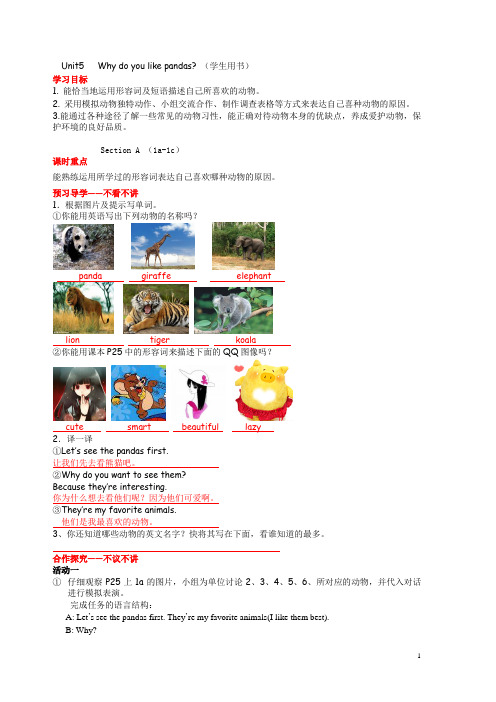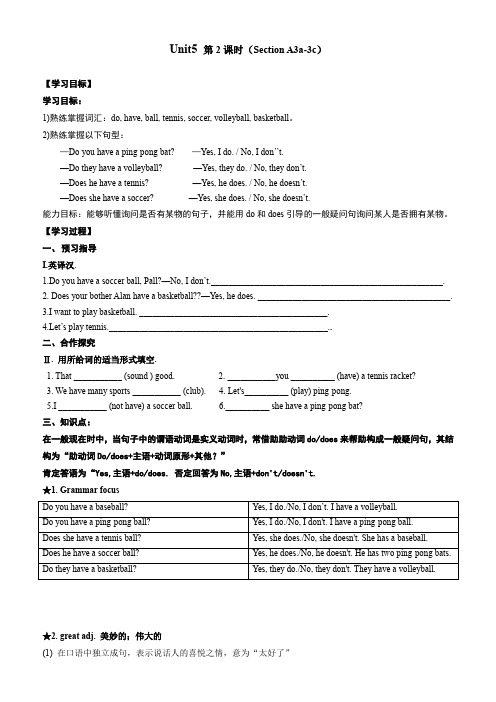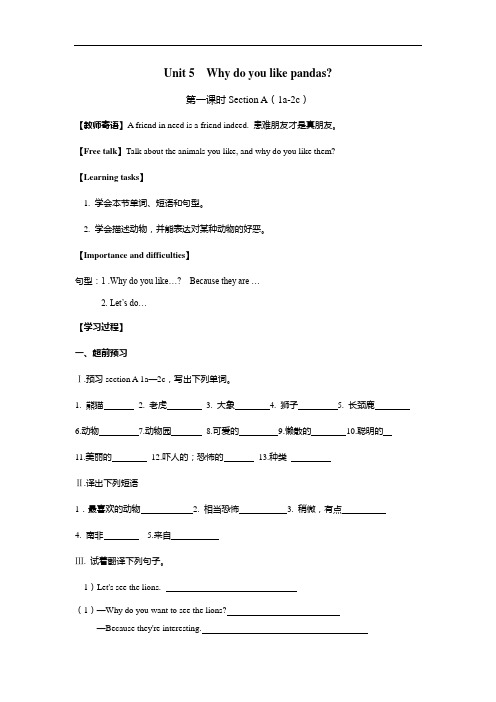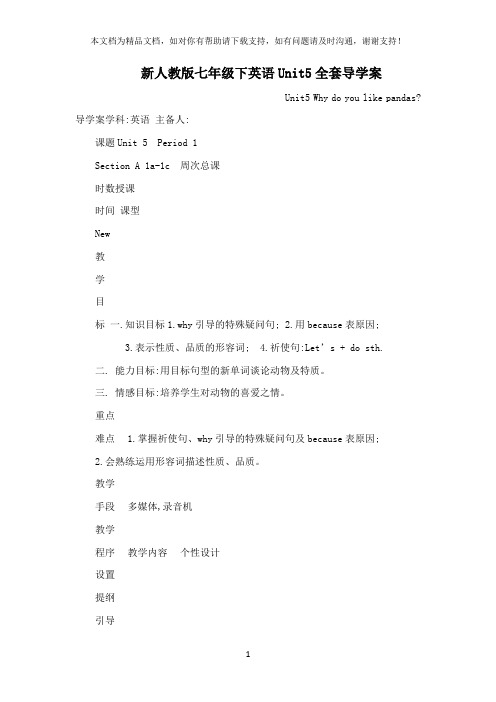新人教版七年级英语知识导学(UNIT 5)
新人教版七年级上册英语导学案(全册)

新人教版七年级上册英语导学案(全册)新人教版七年级上册英语导学案(全册)一、教材分析本教学导学案是针对新人教版七年级上册英语教材的全册进行分析和总结的。
教材以培养学生基本的英语听、说、读、写能力为目标,内容涵盖了常见的日常生活用语、基本的语法知识和词汇。
二、教学目标1. 通过研究本教材,使学生能够熟练运用英语进行简单的交流;2. 培养学生的听力、口语、阅读和写作技能;3. 帮助学生扩大词汇量,并掌握基本的语法规则;4. 培养学生的研究兴趣和自主研究能力。
三、教学内容本教学导学案包含了七年级上册英语教材的全部内容,主要包括以下几个模块:1. Unit 1: Greetings and Introduction2. Unit 2: School Life3. Unit 3: Family4. Unit 4: Hobbies5. Unit 5: Food and Drinks6. Unit 6: At the Weekend7. Unit 7: Shopping8. Unit 8: Holidays四、教学方法为了达到预期的教学目标,我们将采用以下几种教学方法:1. 听力训练:通过听力练,提高学生对英语语音和语调的敏感度;2. 口语练:通过角色扮演、对话练等活动,提高学生的口语表达能力;3. 阅读理解:通过阅读文章、理解问题和回答问题的练,培养学生的阅读理解能力;4. 写作训练:通过写作练,提高学生的写作水平和表达能力;5. 词汇拓展:通过词汇练,帮助学生扩大词汇量。
五、教学评估为了了解学生的研究情况并及时调整教学策略,我们将进行定期的教学评估。
评估方式包括口语测试、阅读测试和书面作业。
同时,我们将鼓励学生积极参与课堂活动并提供及时的反馈和指导。
六、教学资源为了支持教学的开展,我们将充分利用以下教学资源:1. 教科书:新人教版七年级上册英语教材;2. 多媒体设备:投影仪、电脑等;3. 教学软件和网站:提供课堂练和辅助教学资料;4. 研究资料和练册:辅助教材和练资料,帮助学生巩固所学知识。
七年级上英语人教新目标版Unit5导学案

Unit 5 Do you have a soccer ball SectionA1a---2c (1课时)班级:姓名:学号:【学习目标】一、Vocabularies:1. Words: have, ball, tennis, volleyball, basketball, ping-pong, bat, do/does,2. Phrases: soccer ball, tennis ball, ping-pong bat, ping-pong ball, baseball bat,二、Main sentences:1.--Do you /they have a TV? -- Yes, I / they do. /No, I / they don't.2.--Does he /she have a soccer ball? --Yes, he/she does. No, he/she d oesn’t.三、学习动词have的一般现在时的用法;使用do和does引导的一般疑问句的构成以及简单回答。
【课前预习】一、预习活动1a, 翻译下列词组(每空一词):1.英式足球2.网球3.乒乓球拍4.棒球拍5.乒乓球6.有一个排球二、预习1c和2c,完成下列句子。
1. -- you have a (乒乓球拍)? --Yes, I .2. -- you (有)a ping-pong ball? --No, I .3. -- Jane have a (网球)?--Yes, .4. -- he have a (排球)?--No, .三、预习之后的疑问是【学习过程】一、幻灯片展示引出本节课的新单词,并教读这些单词。
二、Match the words with the things in the picture. Then check the answers. (Activity 1a)三、Listening tasks and pair work:1. Listen and circle the words you hear. Write down the sentences you have heard.2. Listen to the conversations and number the pictures. (2a)3. Listen and match the pictures in 2a with the balls. (2b)4. pair work:看2b中的物品,利用下面的句型进行对话比赛。
Unit5讲义人教版英语七年级上册

U5 Do you have a soccer ball必会内容:1学会一些运动项目的名词:soccer ball, tennis, pingpong ball, volleyball等2.掌握句型:“Do you have …? Does he/she have…?3.学会用have对物品的所属进行提问与问答。
4.学会使用描述形容词对事物做出。
5.学会句型“let’s“提建议并在情景中运用。
一.单项选择。
一、单项选择。
( ) 1. The English song ______very nice. Can you guess who is singing?A. smellsB. tastesC. soundsD. feels( ) 2. Let’s ______this song together.A. singsB. singC. singingD. to sing( ) 3. ______ you have a new basketball?A. IsB. AreC. DoD. Does( ) 4. –Let’s play pingpong!–Good idea, ______ I don’t have a bat.A. soB. orC. andD. but( ) 5. Let______ have a look at your sweater.A. myB. meC. ID. mine( ) 6. I only ______that famous star ______TV.A. watch, onB. watch, inC. see, atD. see, in( ) 7. –Do you know his name?–No, I ________.A. am notB. don’tC. can’tD. do ( ) 8. Zhang Wei ______an English dictionary.A. doesn’t hasB. haveC. doesn’t haveD. don’t have( ) 9. –Can you go to the movies ______ me?–Sure. Let’s go.A. withB. forC. toD. on( ) 10. –Do you have a puter game?–_____.A. Yes, it is.B. Yes, I have.C. No, I haven’tD. Yes, I do( ) 11. –Let’s _____pingpong ball. It’s time to have class.–All right.A. aren’t playB.doesn’t playC. don’t playD. not play( ) 12. –Does Anna have a pencil case?–______.A. No, she doesn’tB. Yes, she doC. No, she doD. Yes, she doesn’t( ) 13. –Let’s go to play football.–______.A. Not at allB. Thank youC. That sounds goodD. Good luck( ) 14. –Does your brother have a soccer?–Yes, but he doesn’t play sports. He only______ them on TV.A. watchB. watchesC. look atD. looks( ) 15. –Can Sally play_____ basketball?–No, she can’t.A. theB. aC. anD. /二、用方框中所给词的适当形式填空。
2012年最新人教版七年级下册英语金太阳UNIT5导学案及答案

Unit5 Why do you like pandas? (学生用书)学习目标1. 能恰当地运用形容词及短语描述自己所喜欢的动物。
2. 采用模拟动物独特动作、小组交流合作、制作调查表格等方式来表达自己喜种动物的原因。
3.能通过各种途径了解一些常见的动物习性,能正确对待动物本身的优缺点,养成爱护动物,保护环境的良好品质。
Section A (1a-1c)课时重点能熟练运用所学过的形容词表达自己喜欢哪种动物的原因。
预习导学——不看不讲1.根据图片及提示写单词。
①你能用英语写出下列动物的名称吗?panda giraffe elephantlion tiger koala②你能用课本P25中的形容词来描述下面的QQ图像吗?cute smart beautiful lazy2.译一译①Let’s see the pandas first.让我们先去看熊猫吧。
②Why do you want to see them?Because they’re interesting.你为什么想去看他们呢?因为他们可爱啊。
③They’re my favorite animals.他们是我最喜欢的动物。
3、你还知道哪些动物的英文名字?快将其写在下面,看谁知道的最多。
合作探究——不议不讲活动一①仔细观察P25上1a的图片,小组为单位讨论2、3、4、5、6、所对应的动物,并代入对话进行模拟表演。
完成任务的语言结构:A: Let’s see the pandas first. They’re my favorite animals(I like them best).B: Why?C:Because they’re very cute.②假设我们来到了羊世界,你想先去看谁呢?与小组伙伴一起根据下面的图片练习对话,任务语言如下。
A: A: A:B: B: B:A: A: A:活动二①听P25上1b的磁带第一遍,完成1b 中的听力题,②听第二遍,仿照例句用完整的句子写出你所听到的动物的特点。
人教版七年级英语下册教案Unit 5 Why do you like pandas 单元导学

Unit5 Whydoyoulikepandas?
1.本单元话题以“动物园里的动物”展开,情境属于新课标“人与自然”主题范畴中的“自然生态”这一主题群,涉及子主题“热爱与敬畏自然,与自然和谐共生”。
2.单元主题体现《中国学生发展核心素养》中的“社会参与”方面,提升学生的“责任担当”这一素养,立足于“社会责任”这一基本要点。
3.掌握并使用本单元的动物名称和描述动物特点的形容词,并且结合程度副词对动物进行描述。
4.掌握why 引导的疑问句及其回答方式。
5.通过阅读和写作练习,学会将对动物喜好的原因由口语化形式转为书面描述性语言,完成书面输出。
6.通过本单元的学习,了解各种动物的基本信息和生存情况,提高保护动物、与自然和谐相处的意识。
续表
【课时建议】本单元建议5课时
SectionA(1a-1c)(一课时)
SectionA(2a-2d)(一课时)
SectionA(GrammarFocus-3c)(一课时)
SectionB(1a-1d)(一课时)
SectionB(2a-SelfCheck)(一课时)
词汇短语:主要采用多媒体展示及动作演示法。
基本句子:采用多媒体展示及交际法(利用多媒体展示两人进行交际时的情景)。
语法:主要通过交际、练习让学生掌握学会问答有关动物的喜好。
Unit5 Section A3a-3c导学案人教版七年级英语上册

Unit5 第2课时(Section A3a-3c)【学习目标】学习目标:1)熟练掌握词汇:do, have, ball, tennis, soccer, volleyball, basketball。
2)熟练掌握以下句型:—Do you have a ping-pong bat? —Yes, I do. / No, I don’’t.—Do they have a volleyball? —Yes, they do. / No, they don’t.—Does he have a tennis? —Yes, he does. / No, he doesn’t.—Does she have a soccer? —Yes, she does. / No, she doesn’t.能力目标:能够听懂询问是否有某物的句子,并能用do和does引导的一般疑问句询问某人是否拥有某物。
【学习过程】一、预习指导I.英译汉.1.Do you have a soccer ball, Pall?—No, I don’t._____________________________________________________.2. Does your bother Alan have a basketball??—Yes, he does. ____________________________________________.3.I want to play basketball. ___________________________________________.4.Let’s play tennis.__________________________________________________..二、合作探究Ⅱ. 用所给词的适当形式填空.1. That ___________ (sound ) good.2. ___________you __________ (have) a tennis racket?3. We have many sports ___________ (club).4. Let's__________ (play) ping-pong.5.I ___________ (not have) a soccer ball.6.__________ she have a ping-pong bat?三、知识点:在一般现在时中,当句子中的谓语动词是实义动词时,常借助助动词do/does来帮助构成一般疑问句,其结构为“助动词Do/does+主语+动词原形+其他?”肯定答语为“Yes,主语+do/does. 否定回答为No,主语+don't/doesn't.★1.Grammar focus★2.great adj. 美妙的;伟大的(1) 在口语中独立成句,表示说话人的喜悦之情,意为“太好了”e.g.--Let's play basketball.让我们一起去打篮球吧。
七年级英语上册导学案Unit5_When_was_he_born(Section_B_)

2012-2013上学年初二英语学案第八周第一课时课型:新授课题Unit5 When was he born?(Section B ) 编制人:审核人:学习目标:通过阅读3a文章,让每位同学仿写自己的小传记。
能力目标:能用有关的形容词来描述人,并能用一般过去式来谈论熟知的,敬佩的人物。
情感目标:让学生学会合作交流,形成正确的人生观和世界观课前延伸:预习课本Section B,找出下列词组和句子。
(1)对某人友好_____ (2) 因……而著名_____(3)作为……而著名(4)一位慈爱的祖父(5)和他的孙子一起度过他所有的闲暇时间_______________ ________ (6)一位著名的小提琴手______________ (7)开始滑冰(8)看过她演奏(9)看见某人做过某事(10)看见某人在某事(11)成为一名滑冰冠军(12)游览美国(13)一位著名的中国钢琴家(14)哼唱歌曲和有难度的乐曲(15)开始学手风琴(16)在四岁时(17)开始学钢琴(18)参加(19)第14届肖邦国际钢琴比赛(20)获得他所在参赛组的一等奖(21)第一位获得此奖的中国钢琴家(22)在70年历史的比赛中(23)第一个做某事(24)活着的(25)出名自主学习:掌握下列知识点1、be fiendly/ kind to sb. 意为例句:2、be famous for. 意为; be famous as. 意为Lu Xun was famous ______ a great writer. Lu Xun was famous ______ his article3、see sb. do sth. / .see sb. doing sth.I often saw him ________(read) books in the classroom.I saw him ________(read) books in the classroom just now.4、Nieer is a well-known Chinese musician.5、two pieces of music、be the first one to do sth.He is always the first /third/last one to get to school.He was the third one to reach the top of the mountain.2、“数词-名词(单)-adj.”结构作定语 a 4-year-old boy ; a three – meter – tall tree He is ___________ this year. A. 14 years old B. 14-year-old 反馈点拨:alive意为―活着的‖,―在世的‖,用作定语时,应将其放在被修饰的名词后面。
七年级英语人教版下册导学案 Unit 5 Why do you like pandas

Unit 5 Why do you like pandas?第一课时Section A(1a-2c)【教师寄语】A friend in need is a friend indeed. 患难朋友才是真朋友。
【Free talk】Talk about the animals you like, and why do you like them?【Learning tasks】1. 学会本节单词、短语和句型。
2. 学会描述动物,并能表达对某种动物的好恶。
【Importance and difficulties】句型:1 .Why do you like…? Because they are …2. Let’s do…【学习过程】一、超前预习Ⅰ.预习section A 1a—2c,写出下列单词。
1. 熊猫2. 老虎3. 大象4. 狮子5. 长颈鹿6.动物7.动物园8.可爱的9.懒散的10.聪明的11.美丽的12.吓人的;恐怖的13.种类Ⅱ.译出下列短语1.最喜欢的动物 2. 相当恐怖 3. 稍微,有点4. 南非5.来自Ⅲ. 试着翻译下列句子。
1)Let's see the lions.(1)—Why do you want to see the lions?—Because they're interesting.IV. 找出你的疑惑:____________________________________________________________________________________________________________________________二、课中学习I. 预习检测写出本课中的七个描述品质特征的形容词:我们学过的此类形容词还有:II. 解决疑惑自主互助学习知识剖析:1.Let's see the lions. 让我们看狮子吧!Let's = Let us 意思是“让我们.......吧。
人教版七年级英语上册第5单元_教学设计

文化意识
初步了解英语国家的礼貌习惯
教学重点和难点
重点:A.学会就有关人物之间所属关系进行问答的句子;
B.学习并掌握Let's...的句型
难点:A.学会使用描述性形容词对事物做出评价
B.学会用第三人称单数的一般疑问句及回答做对话。
教学设计要点
1.快速猜词,复习已学过的球类名称;
进一步为学生创造语言情景,熟练应用。使学生成为语言的主人。
利用课件展示的情景描述第三
听力练习
将课本P29的3a作为听力材料,训练学生快速记忆与复述的能力
通过听力练习向学生输入更多的与本课基本句型相关的语言材料。
步
骤
7
作业:写一篇短文,描述自己的同桌都有哪些学习用品,并且说明他们在什么地方
学生通过由词——句——短对话——长对话——谈论他人所拥有的物品,在教学中促进了学生之间的彼此了解。
3.运用所学语言进行对话
4.叙述文段
通过课前查字典,及音标识词参与小组活动,调动学生学习的主动性、积极性。
过程评价活动
步骤
1
Guessing game:
快速抢答
T: Let's play a guessing game.
What's this?
S1: Basketball.
T: How about this one?
通过学生活动及汇报小组准备结果,鼓励学生积极运用所学语言材料。
步
骤
5
My friend's bedroom.个人口头汇报活动2
S: I want to say something about my friend's bedroom. He has a bag. It's on the bed. He has three books. They are on the desk....
新人教版七年级下英语Unit5全套导学案(可编辑)

新人教版七年级下英语Unit5全套导学案 Unit5 Why do you like pandas? 导学案学科:英语主备人:课题Unit 5 Period 1Section A 1a-1c 周次总课时数授课时间课型New教学目标一.知识目标1.why引导的特殊疑问句; 2.用because表原因;3.表示性质、品质的形容词;4.祈使句:Let’s + do sth.二. 能力目标:用目标句型的新单词谈论动物及特质。
三. 情感目标:培养学生对动物的喜爱之情。
重点难点 1.掌握祈使句、why引导的特殊疑问句及because表原因;2.会熟练运用形容词描述性质、品质。
教学手段多媒体,录音机教学程序教学内容个性设计设置提纲引导I、预习交流1. 根据音标拼读单词并牢记;2. 自学课文,勾画出重点和疑惑。
II、翻译官1. welcome to the zoo ___________2. my favorite animals ______________3. want to see them______________4大象_________________________5. 树袋熊,考拉 ______________ 6. 长颈鹿________________________ 自主探究,请带着下面这些问题阅读教材。
Let’s 后接动词的什么形式?why 引导的特殊疑问句可用什么进行回答?激趣生疑明确目标T: Did you go to the zoo?S: Yes ,I do / No , I don’tT: What animals do you like?S: I like ……Now ,let’s see the animals.Do you know their names? Please answer in English.明确目标:Today ,let’s talk about what animals you like ,and learn to talk about why you like them展示交流释疑一.回顾已知,导入新课1.不能在走廊上跑。
Unit 5 A( 1 )导学案 2022-2023学年七年级上册英语

知识巩固:
Ⅰ.根据首字母和句意补全单词
1.Where did Jim go onv?
2.—Where did you go,Gina?—Ivthe museum.
3.The boy went to the summercand he had great fun.
4.—Did you go to New York City?—No,Id.
5.My fathersat home andwTV yesterday.
Ⅱ.翻译下列短语
1.Long time no see2. be on vacation
3. go to …with my family4. go somewhere interesting
5.— ____ did you go there with?— I went there with my parents.
A.WhereB. WhoC. WhenD. How
Ⅳ.完成句子
1.你去哪里度假了?Where _______you ______ on vacation?
2.我参加了夏令营。I went to ___________ ___________.
4. —Where would you like to go on vacation, Lily?
—It’s hot here. I’d like to go ____.
A.anywhere coolB. cool somewhere
C. somewhere cool D.cool anywhere
4. ________ you ________(watch) the soccer game last Friday afternoon?
2017最新人教版七年级下册英语科导学案Unit5

Unit 5 Why do you like pandas?Section A【教师寄语】Love me, love my dog. 爱屋及乌。
【学习目标】【学习重点】1、掌握生词和句型;2、描述动物,谈论喜好。
【学习过程】1. New words and expressionspanda /'pændə/ n.熊猫zoo/zu:/ n.动物园tiger /'taɪgə(r)/ n.老虎elephant /'elɪfənt/ n.大象koala /kəʊ'ɑ:lə/n.树袋熊;考拉lion/'laɪən/ n.狮子giraffe /dʒə'rɑ:f/, /dʒə'ræf/n.长颈鹿animal /'ænɪml/ n.动物cute /kju:t/ adj.可爱的;机灵的lazy /'leɪzi/ adj.懒散的;懒惰的smart /smɑ:(r)t/adj.聪明的beautiful /'bju:tɪfl/ adj.美丽的;美好的scary /'skeəri/, /'skeri/ adj.吓人的;恐怖的kind/kaɪnd/ n.种类Australia/ɒ'streɪlɪə/ n.澳大利亚south /saʊθ/adj.南方的; n.南;南方Africa /'æfrɪkə/ n.非洲pet/pet/ n.宠物leg/leg/ n.腿cat/kæt/ n.猫sleep /sli:p/ v.&n.睡觉South Africa 南非kind of 稍微,有点儿black and white 黑白相间2.Read and practice1)Let’s see the pandas first. 让我们先看看熊猫吧!2)They’re kind of shy. 他们有点儿害羞。
人教版英语七年级上册unit 5 lesson 1 导学提纲 教案

初一英语导学提纲
第 2 页 (共 4 页)
磁县朝阳学校学生课堂导学提纲 编号:YYTG-七年级上-021 七年级人教版(2013-10-21 ) 主备人:徐佳宁 审核:初一英语组 Rome was not built in one day.冰冻三尺非一日之寒。
初一英语导学提纲
第 7 页 (共 4 页)
初一英语导学提纲
第 8 页 (共 4 页)
四、Ⅵ阅读理解(10 分) 【当堂检测】 必做题 一、单项选择(6 X 10 分 = 50 分) ( ) 1. I ____ a dog and two cats. A. is B. am C. are D. have. ( ) 2. she _____ a nice watch. A. is B. has C. have D are ( ) 3. _____ you have a tennis ball? A. Are B. Is C. Do D. Does ( ) 4. _______ she have a set of keys? A. Are B. Is C. Do D. Does ( ) 5. ______ Jim ______ an interesting Chinese teacher? A. Do ;have B. Do ; has C. Does ; has D. Does; have 三、句型转换( 50 分) 1. I have a daughter. (一般疑问句) ______ you _______ a daughter? 2. He has an English dictionary. (一般疑问句) _______ he ______ an English dictionary? 3. Do you like apples? (肯定答语 ) ________, I ________. 4. Does she have a big bed? ( 否定答语 ) ________ , she __________. 5. The student has three names. (否定句) The students ________ _______ three names. 选做题 三、写句子。( 10 分) 1、你有一个乒乓球拍吗? 是的,我有。 A篇 I am a middle student. My name’s Robet.Thomas.Brown. I am 14 years old. I am in Class 3Grade 7. I have a sister. She is a student,too. We are in the same school. But she is in Class 2 Grade 7. I have a baseball. But I don’t have bats. She has bats , but she doesn’t have a baseball . we often play it after school. I also like playing basketball. But she doesn’t. 正确的填 T 错误的填 F ( ) 1. My family name is Robet. ( ) 2. My sister and I are in the same school. ( ) 3. My sister ane I aren’t in the same class. ( ) 4. My sister has a basketball. ( ) 5. My sister and I like playing basketball. B篇 I am a Chinese boy. My name is Li Ming. I’m a student. In my class, some of the boys like playing football very much. Wu Jun and I are on school football team. And some of them like playing basketball. But the girls like playing tennis and volleyball. Han Mei and Z hang Hong are on school volleyball team. Each of them has a te nnis racket. In a word (总之), everyone in our class likes sports very much. ( ) 1. Li Ming is in ______. A. China B. America C. Canada D. France ( ) 2. Li Ming likes playing ______. A. basketball B. football C. volleyball D. tennis ( ) 3. The girls like playing ______. A. tennis and bas ket ball B. football and basketball C. tennis and volleyball D. volleyball and basketball ( ) 4. ______ and Li Ming are on school football team. A. Wu Jun B. Han Mei C. Zhang Hong D. Some of the boys ( ) 5. Each of the girls has a ______. A. tennis racket B. baseball bat C. volleyball D. basketball
人教七年级下unit5知识点

人教七年级下unit5知识点在人教七年级下unit5课程中,我们学习了关于“食物和饮料”这一主题的知识点。
以下是本单元主要的知识点:一、单词和短语1. 食物:fruit, vegetables, chicken, fish, bread, rice, noodles, milk, cheese, cake 等。
2. 饮料:water, juice, tea, coffee, cola, lemonade 等。
3. 特殊饮食需求:vegetarian(素食主义者), vegan(纯素食主义者)等。
4. 食物和饮料的数量:a glass of milk, a cup of tea, a bottle of water, a loaf of bread 等。
二、语法1. 倒装句:在英语中,为了强调某些语句内容,常使用倒装句。
例如:Never have I seen such a beautiful sunset.(我从未看过如此美丽的日落。
)2. 疑问句类型:在英语中,疑问句有两种类型,一种是一般疑问句,以助动词开头,另一种是特殊疑问句,以特殊疑问词开头。
例如:Do you like apples?(你喜欢苹果吗?)What kind of food do you like?(你喜欢什么食物?)三、口语表达1. 询问对方喜欢什么食物、饮料等:What kind of food/drink do you like?2. 询问对方是否饱了:Are you full?3. 表达自己的饮食要求:I am a vegetarian.4. 发表自己对食品的看法:I love pizza. It's delicious.以上就是本单元的主要知识点,希望同学们能够通过学习,掌握这些基础的英语单词和语法知识,为今后更高层次的英语学习打下坚实的基础。
- 1、下载文档前请自行甄别文档内容的完整性,平台不提供额外的编辑、内容补充、找答案等附加服务。
- 2、"仅部分预览"的文档,不可在线预览部分如存在完整性等问题,可反馈申请退款(可完整预览的文档不适用该条件!)。
- 3、如文档侵犯您的权益,请联系客服反馈,我们会尽快为您处理(人工客服工作时间:9:00-18:30)。
Unit 5 Do you have a soccer ball?目标认知重点词汇和短语:have let us many club more interesting boring fun difficult relaxing greatbut only every day tennis racket ping-pong bat play tennis sound good watch TV play basketball play volleyball play sports重点句型:1. I don’t have a soccer ball.我没有英式足球。
2. We have many sports clubs: basketball ,ping-pong, soccer,and more.我们有许多体育俱乐部:篮球,乒乓球,足球等。
3. Ed Smith has a great sports collection.埃德.史密斯有大量的运动用品收藏。
4. But he doesn’t play sport-he only watches them on TV.但是,他不做体育运动-他只是在电视上看。
5. She plays sports every day.她每天进行体育运动。
语法:动词have的用法日常用语:1. -Do you have a basketball? 你有篮球吗?- Yes, I do. /No, I don’t. 是的,我有。
/不,我没有。
2. Let’s play volleyball. 让我们打排球吧。
3. That sounds good/interesting/boring. 那听起来很好/有趣/令人厌烦。
4. -Does he have a tennis racket? 他有网球拍吗?- Yes, he does./ No, he doesn’t. 是的,他有。
/不,他没有。
精讲巧练1. -Do you have a ping-pong ball?- Yes, I do. /No, I don’t.你有乒乓球吗?是的,我有。
/不,我没有。
点拨本句子的动词have的意思是“有”,它表示某人有某物,是表示所属关系,即某物归某人所有,经常用在肯定句中。
如果变为一般疑问句需要在句子开头加助动词do,如果构成否定句需要在动词have的前面加助动词don’t。
助动词的后面用动词原形。
例如:Do you have a book? 你有一本书吗?Yes, I do. 是的,我有。
回答这个一般疑问句的时候经常用肯定回答Yes, I do.或者否定回答No, I don’t.不能用Yes, I have.或者No, I haven’t.如果是用一般疑问句Have you got a book?来问可以用Yes, I have.或者No, I haven’t.来回答。
英式英语习惯用“Have you got…?”;在美式英语中用“Do you have?”。
随时练【考例】-_____ you _______ an English book?-No, I don’t.A. Do; haveB. Does; haveC. Are; haveD. Are; has【答案与解析】A。
根据对话后面的回答是否定回答,可以判断前面的句子用一般疑问句来询问“你有一本英语书吗?”本句子的主语是第二人称,所以用助动词do构成一般疑问句,助动词do的后面用动词原形have。
2. -Does he have a tennis racket?- Yes, he does./ No, he doesn’t.他有网球拍吗?是的,他有。
/不,他没有。
点拨本句子的主语是第三人称单数形式he,所以谓语动词“有”用has,但是,在构成一般疑问句的时候用助动词does来体现第三人称单数形式,助动词does的后面用动词原形have。
例如:My brother has a new bike. 我的哥哥有一辆新自行车。
这个句子变为一般疑问句是:Does your brother have a new bike? 你的哥哥有一辆新自行车吗?本句子的肯定回答是Yes, he does.否定回答是No, he doesn’t。
随时练【考例】-______ your father _______ a new car?-Yes, he does.A. Do; hasB. Do; haveC. Does; haveD. Does; has【答案与解析】C。
从本句子的后面回答是肯定回答可以判断前面的句子是一般疑问句,主语your father是第三人称单数形式,所以用助动词does构成一般疑问句,后面用动词原形have,而不用has。
3. Let’s play soccer.咱们踢足球吧。
点拨这是一个祈使句,let somebody do something的意思是“让某人做某事”,表示说话人的一种建议。
它的否定形式是Let somebody not do something或者Don’t let somebody do something。
例如:Don’t let your brother swim here. 不要让你的弟弟在这里游泳。
对于以Let’s或者Let us开头的祈使句,它的肯定回答一般用OK/ All right/Sure;它的否定回答一般用Sorry. I ________。
拓展以Let’s开头的句子改为反意疑问句的时候,后面的附加疑问句用shall we?因为Let’s是把说话人包含在us之内;以Let us开头的句子改为反意疑问句的时候,后面的附加疑问句用will you? 因为let us没有把说话人包含在us之内。
随时练【考例】_______ her go home now, _________? .A. Don’t let; shall youB. Doesn’t let; OKC. Don’t let; will youD. Don’t let; shall we【答案与解析】C。
本句子是考查祈使句和反意疑问句的用法。
祈使句的否定形式是在句子前面加助动词Don’t,不要受her的影响。
否定形式的祈使句改为反意疑问句的时候,后面的附加疑问句用will you? 综合考虑本句子选择C。
4. I don’t have a soccer ball.我没有英式足球。
点拨(1.)本句子是否定句形式,句子的主语是第一人称单数形式I(我),表示“我有某物”的时候用I have a +名词,变为否定句的时候在动词have的前面用助动词don’t,助动词don’t的后面用动词原形。
例如:We don’t have many books. 我们没有许多书。
(2.)如果句子的主语是第三人称单数形式,表示“某人有某物”用has,构成否定句的时候在动词前面加助动词doesn’t,后面用动词原形have,不能再用has。
例如:My father has a big house. 我的爸爸有一座大房子。
否定句是:My father doesn’t have a big house. 我的爸爸没有一座大房子。
随时练【考例】Our English teacher ______ a new car. Can you lend her a new one?A. don’t haveB. doesn’t haveC. don’t hasD. doesn’t has【答案与解析】B。
本句子是考查否定句的用法,主语是第三人称单数形式Our teacher,表示“他有某物”用has,构成否定句的时候用助动词doesn’t+动词原形have。
5. We have many sports clubs: basketball ,ping-pong, soccer,and more.我们有许多体育俱乐部:篮球,乒乓球,足球等。
点拨1本句子中的many是“许多”的意思。
它的后面只能用可数名词的复数形式,它的同义词much只能修饰不可数名词。
与some相比较,many的数量更多一些,但是some的后面可以用可数名词的复数形式,也可以用不可数名词。
例如:We have many new books. 我们有许多新书。
There is some water on the floor. 地板上有一些水。
点拨2本句子的单词more表示“另外、又、再、额外”的意思,这时候经常放在some,a little,few或者具体的数词的后面。
这时候的单词more相当于another的意思。
例如:We need two more chairs.=We need another two chairs. 我们还需要两把椅子。
随时练【考例】They have many apples, but they need ______.A. two anotherB. two moreC. more twoD. two many【答案与解析】B。
从本句子的意思“他们有许多苹果,但是他们还另外需要两个”可以判断是用two more表示“额外的、另外的两个苹果”的意思。
6. Ed Smith has a great sports collection.埃德.史密斯有大量的运动用品收藏。
点拨本句子的单词collection是名词,它的意思是“收藏品、收集物”,它是由动词collect后缀-tion变化来的。
例如:These are my collection.这些是我的收藏品。
My brother has a very good collections of stamps.我的弟弟收集了许多邮票。
注意:a great的意思是“大量的、许多的”。
例如:They give us a great help. 他们给我们许多的帮助。
随时练【考例】At that moment, they need ______ time.A. manyB. lotC. a lotD. a great【答案与解析】D。
本句子用a great来修饰不可数名词time表示“大量的时间”的意思,many修饰可数名词的复数形式。
7. But he doesn’t play sport-he only watches them on TV.但是,他不做体育运动——他只是在电视上看。
点拨1本句子的主语he是第三人称单数形式,动词play构成否定句需要用助动词doesn’t +动词原形。
例如:My mother doesn’t like watching TV.我的妈妈不喜欢看电视。
点拨2动词短语“看电视”用动词watch TV注意:和其他的几个表示看的动词see,look,read用法不同。
